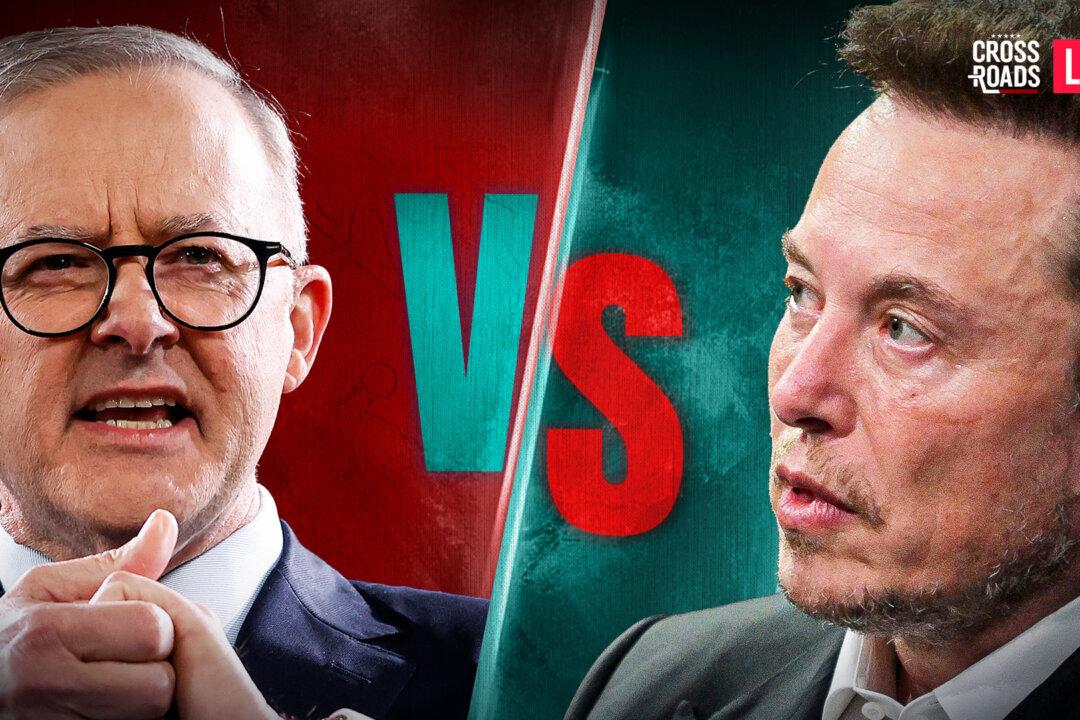Imagine if a political party announced a new system of control over Hollywood that banned any negative portrayals of that party, and any negative portrayals of its police force or military. Imagine if it also banned positive portrayals of religion or any depiction of the supernatural, and if it banned any films that showed people violating its laws.
Hollywood is actually already following all of these requirements. But it’s not doing this on behalf of any U.S. political party. Rather, it is censoring movies to appease the Chinese Communist Party (CCP), in hopes of getting films into the Chinese market. And these films altered to appease the Chinese regime are often the same ones being shown in U.S. theaters.
Chinese companies are now buying key businesses in the American film industry, while many American filmmakers are partnering directly with Chinese companies and working directly with CCP offices to censor and alter their films. The CCP is now gaining control over what Hollywood can and cannot produce.
The stated interest of Chinese leaders in influencing Hollywood goes far beyond mere censorship and profit. They are waging a cultural war, and their victims are American viewers and the creative freedom of an American icon.
Hollywood is America’s dream factory. More than any other cultural form, it shapes the American imagination. It gives us common ground for a national conversation, and, to a significant degree, our national character is formed through the medium of popular film. And now the CCP is inserting itself directly into the making of the stories we use to understand ourselves.
Perception Management
According to an Oct. 28, 2015, report from the U.S.-China Economic and Security Review Commission (USCC), “China views film as a component of social control,” and notes that when it comes to Chinese policies for regulating content in films, “the CCP’s concerns are positioned above all other interests.”
This position can be seen clearly in some of the films that have been censored or blocked due to the CCP’s systems of control.
The 2013 film “Captain Phillips” features Tom Hanks as an American cargo ship captain who is rescued from Somali pirates by a team of U.S. Navy SEALs. The report states the CCP blocked it from being shown in China “because of the film’s positive portrayal of the United States and U.S. military.”

A scene in the 2006 film “Mission: Impossible 3,” starring Tom Cruise, showed clothes drying on a clothesline in Shanghai. It was removed from Chinese screenings, the report states, “because it was not a positive portrayal of Shanghai, despite the fact that the film was partially shot in Shanghai, where many people do not own dryers.”
The report notes the 2012 film “Men in Black 3” was “forced to cut a scene in which civilians’ memories are erased, a scene that a Chinese newspaper wrote may have been perceived as a commentary on China’s internet censorship policies.”
A list of similar cases could go on for some time, and could include the 2010 film “Karate Kid,” which, despite being made with heavy CCP oversight, ran into trouble because its villain was Chinese; and a 3-D release of the 1985 film “Top Gun,” which was rejected, the report states, “because it portrayed U.S. military dominance.”
According to Amar Manzoor, author of “The Art of Industrial Warfare,” the CCP’s use of films can be understood as similar to the way a company promotes its brand while attacking that of its key rival.
Manzoor used the 2014 film “Transformers: Age of Extinction” as an example. The action film featured at least 10 Chinese product placements—from real estate companies to computers to wine. He said, “From the media side they were looking for a Chinese presence within the American film industry, because they can get better penetration with American films than they can with just Chinese films.”
It plays into the broader idea, Manzoor said, that if you infiltrate a high-class culture, and place yourself in a perceived favorable position alongside it, it has the effect of improving the image of your own brand.
The CCP’s “brand” is one of human rights abuses, censorship, shoddy products, espionage, and authoritarian rule, but through censoring film, the Party aims at skewing international perceptions in its favor. It forces Hollywood not to show any of these negative elements and instead to give China a false, positive image. And it also forbids Hollywood films from giving a positive portrayal of the United States, the Chinese regime’s main competitor.
According to Ronald J. Rychlak, a law professor at the University of Mississippi School of Law, authoritarian regimes have been using films for political gain since the early 20th century.
“The entertainment industry is tremendously influential—go back and look at how the Soviets controlled movie theaters and ballet. The Nazis did the same thing,” Rychlak said.
Rychlak is well versed in the topic. He co-wrote the book “Disinformation“ with Lt. Gen. Ion Mihai Pacepa, the highest-ranking Soviet bloc intelligence official to ever defect to the West, and details tactics used by communist regimes to create false narratives and alter perspectives.
“The best arts cause us to question, to think,” Rychlak said. “They motivate us to consider new options, and the communists don’t want that.
“Artists may talk about the power of art, but totalitarians really understand the power of art, because they abuse it.”
A System for Control

Hollywood has been open to the CCP’s censorship because it believes there is a golden opportunity in the China market.
The CCP manipulates Hollywood’s desire to cooperate by limiting how many foreign films are allowed in, a quota system that violates the rules of the World Trade Organization (WTO). Only 34 Western films may be shown in China each year, and so the Western studios are made to compete with one another for the CCP’s favor.
The terms of entrance are strict. Hollywood must choose between getting a 25 percent cut of box office sales or selling their films to the CCP at a set price. The films are chosen by the Chinese state agency in charge of film censorship known as the State Administration of Press, Publication, Radio, Film and Television (SAPPRFT).
“While SAPPRFT’s authority is intentionally broad, its mandate specifically includes provisions protecting the interests of the CCP,” states the report, noting that the agency’s director, “like all SAPPRFT officials,” is a member of the CCP “with a long career as a propagandist.”
Eligibility for one of these 34 film slots, meanwhile, is a bit like Russian roulette, since the CCP isn’t consistent about what film content it allows and what it rejects. This leads filmmakers to go beyond the CCP’s surface-level standards and make more direct attempts to appease Chinese censors.
Leaked emails from Sony Pictures Entertainment exposed some of the thinking behind studios’ alterations to fit the CCP’s liking. According to a July 2015 report from Reuters, Sony executives removed a scene of the Great Wall being damaged and of a “Communist-conspiracy brother” hacker in the 2015 film “Pixels” because they feared the scenes would impact the film’s eligibility for the Chinese market. Scenes showing the Washington Monument, the Taj Mahal, and parts of Manhattan being destroyed were left in.

“Even though breaking a hole in the Great Wall may not be a problem as long as it is part of a worldwide phenomenon, it is actually unnecessary because it will not benefit the China release at all. I would, then, recommend not to do it,” wrote Li Chow, chief representative of Sony Pictures in China, in a December 2013 email to senior Sony executives, according to Reuters.
Other films have taken similar measures. The 2012 film “Red Dawn” originally featured Chinese communists invading the United States, but this was changed to North Koreans.
Hollywood has another path to the China market besides self-censorship: working directly with Chinese companies on the films and granting CCP officials with SAPPRFT more direct oversight of the filmmaking process. Taking this approach means the films aren’t classified as foreign films.
The coproductions come with additional requirements, however. According to the USCC report, these can include “having at least one scene shot in China, casting at least one Chinese actor, receiving a minimum one-third of the movie’s total investment from Chinese companies, and, in general, illustrating ‘positive Chinese elements.’”
The 2013 film “Iron Man 3,” for which Disney partnered with China’s DMG Entertainment Group, took this approach. The filmmakers took heavy steps to appease the CCP, such as creating additional scenes and locations in the Chinese version that featured Chinese actors and Chinese locations. They also cast British actor Ben Kingsley as the villain named The Mandarin, a character that is Chinese in the comic books the film is based on.
If you’ve started to notice that Hollywood films are increasingly showing the United States in a negative light, as well as opposing religion and praising the Chinese regime, you’re not imagining things—these are requirements that the CCP has placed on Hollywood, and most major studios are following these requirements in order to get a spot in Chinese theaters.
And with Chinese companies on a spree of buying or partnering with foreign film assets, these forms of censorship could soon become even more prevalent.
China’s Shopping Spree

While Hollywood has been busy seeking out Chinese companies for partnerships to get an easier ticket to China, Chinese companies have been settings their sights on film assets abroad, deepening the CCP’s influence over the global film industry.
Dalian Wanda Group became the first Chinese firm to own a major Hollywood studio in January when it purchased Legendary Entertainment for $3.5 billion in cash. This followed its purchase of AMC Entertainment Holdings, which operates AMC Theaters—the second largest cinema chain in the United States—in 2012 for $2.6 billion.
It also owns Australian movie theater company Hoyts Group, leading European cinema operator Odeon & UCI Cinemas Group, and China-based Wanda Cinema Line, and there are reports of it trying to buy a 49-percent stake in Paramount Pictures.
Other major Chinese companies involved in targeting Western assets include Tencent, DMG Entertainment (DMG Yinji), Baidu, and the state-owned television outlet CCTV.
Many of these companies have opaque connections to the CCP, but regardless of how deep their ties do or do not go, most companies in China are required to have a CCP liaison. The state-run Chinese news outlet Xinhua recently published a report that stated this requirement, noting that “the Party constitution stipulates that organizations of more than three members” should have a CCP branch. This requirement also includes foreign companies with offices in China.
Regardless of whether or not the companies themselves have motives to promote the CCP, being based in China means they are held to the CCP’s laws—including its laws on censorship. And at the higher levels of the Chinese regime, the CCP has clearly stated its interest in using films and other forms of information and entertainment to strategically push its own agenda.
‘Culture Warfare’

In October 2012, former CCP leader Hu Jintao gave a speech at a party plenum that “some foreign media saw ... as a declaration of war against Western culture,” as Asia Times noted.
Hu said that as a matter of strategy, many countries “strengthen their cultural soft power.” He went on to claim that “international hostile forces are stepping up their strategic attempts to Westernize and divide our country, and ideological and cultural fields are a focus of their long-term infiltration.”
He accused Western “spiritual pollution” and “bourgeois liberalization” as the cause of pro-democracy movements and called on the CCP to “heighten our vigilance” and to “take effective countermeasures.”
The speech coincided closely with Dalian Wanda Group’s 2012 purchase of AMC Theaters.
In a November 2012 report on Hu’s speech, Huffington Post noted: “One thing we can count on is a revamped effort at censorship, Big Brother surveillance, and thought control. This may sound like hyperbole, but it isn’t; President Hu Jintao has, in fact, been very blunt on these points.”
While such a strategy from the CCP may sound secretive and dubious, the CCP has actually been fairly loud with its rhetoric against U.S. entertainment and with its own strategies to counter this with “culture warfare.”
David Major, founder and president of the CI Centre, a U.S.-based company offering training in counter-intelligence, explained the nature of the CCP’s ideas behind culture warfare during a June 9, 2016, testimony to the USCC. He said culture warfare “means influencing the cultural biases of a targeted country by imposing your own cultural viewpoints.”
Major noted the strategy ties to a broader Chinese unconventional warfare system known as Unrestricted Warfare, detailed in 1999 by two Air Force colonels and political officers in the People’s Liberation Army. Culture Warfare was just one of 12 strategies they laid out in what they called war with “no limits” and “without morality.”
One of the CCP’s more recent strategies along these lines, known as the Three Warfares, pulls directly from the Unrestricted Warfare doctrine and focuses more specifically on perception management. The CCP’s Central Committee and the Central Military Commission approved the Three Warfares for use by the CCP’s People’s Liberation Army in 2003.
The Three Warfares are Psychological Warfare, Media Warfare, and Legal Warfare. In a March 2015 report, U.S. Special Operations Command explained the CCP’s use of these warfare concepts—as well as similar concepts used by Iran and Russia—and called on the United States to begin countering them.
The two parts of the Three Warfares strategy directly relevant to culture warfare are Psychological Warfare and Media Warfare. According to the report, Psychological Warfare “seeks to undermine an enemy’s operational ability by demoralizing enemy military and civilian populations” using systems including television, radio broadcasts, rumors, and other means. Media Warfare “seeks to influence domestic and international public opinion to build support for military actions and dissuade adversaries from actions contrary to China’s interests.”
Legal Warfare, the third tier of the system, can be seen playing out in the CCP’s manipulation of international law by restricting imports on films, in violation of WTO rules.
Many public remarks by CCP leaders and military officers demonstrate how the Chinese regime views the strategic use of entertainment under the doctrine of Culture Warfare.
In December 2013, the Chinese military newspaper Zhongguo Guofangbao slammed a video game, “Battlefield 4,” for portraying a Chinese general as its villain. It accused the game of being “a new form of cultural penetration and aggression” that aimed “to discredit one country’s image in the eyes of other countries.” It also claimed that featuring a Chinese general as an enemy in the game would cause Western audiences to see China as the “common enemy.”
When the above statements are taken in context along with the CCP’s banning of films like “Captain Phillips” and the 3-D version of “Top Gun” for showing the U.S. military in a positive light, the strategic thinking becomes more clear.
In August 2014, the CCP began restoring 1930s films for what South China Morning Post called a “culture war” and “soft power push.” It noted the CCP said in June 2014 it would invest 100 million yuan (about $15 million) to fund 5–10 “influential films.”
Zhang Hongsen, the head of SAPPRFT, said, according to South China Morning Post: “It must be recognized we are in a full state of competition with American films. ... This is about defending and fighting for cultural territory.”




